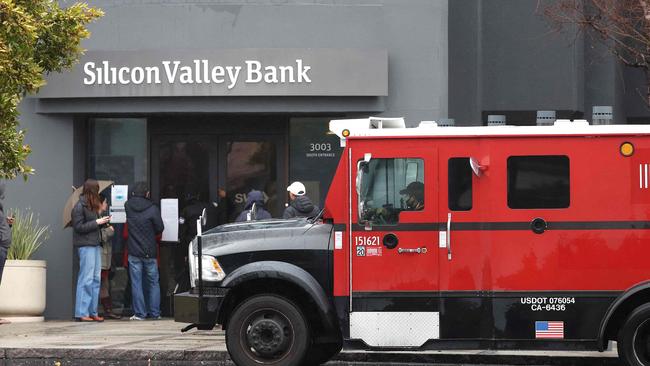Knock-on effects of SVB to be felt across economy and banking
The dramatic collapse may curb domestic financial institutions’ risk appetite, cause funding issues for the start-up sector and trigger impacts across the economy and banking industry.

The dramatic collapse of Silicon Valley Bank may curb the risk appetite of domestic financial institutions and cause funding issues in the start-up sector, which will trigger knock-on impacts across the economy and banking industry.
SVB - which focused on banking and lending to start-ups - collapsed on Friday in the US, marking the second-largest bank failure in that market’s history, after a run on deposits thwarted the lender’s plans to raise fresh capital. SVB’s demise spurred panic in banking markets including fears of further runs on smaller banks in the US.
SVB provided loans, debt and other banking services to a spate of start-ups with operations in Australia, which will have ripple effects in this market as some seek out other funding options or have their accounts frozen. The SVB collapse could therefore have ramifications for the jobs market, the economy and lenders here that also bank companies that had relationships with SVB.
McLean Roche Consulting managing director and payments stalwart Grant Halverson said SVB had been caught out by the rapid rise in interest rates and ill-timed bond investments, and its collapse would hard hit any start-ups entangled with the bank.
“A lot of them can’t pay wages next week because their accounts are frozen and any public companies will have to lodge ASX statements,” he said.
“This will tip a lot of them over. It will push them to the wall. It couldn’t have happened at a worse time (for the fintech industry).”
But Mr Halverson noted despite the panic in the US, Australia’s large banks would be protected because their loan books did not exhibit large levels of concentrations to particular sectors.
“This (SVB collapse) is about a lack of diversification…. Aussie banks learnt in 2008 not to do that,” he said.
Matthew Haupt, the lead portfolio manager at WAM Leaders, said the demise of SVB did raise the prospect some lenders would begin reining-in the levels of risk they took on loans as a result.

“People will be pulling back on risk in lending in the short term,” he added. There is a slight risk of contagion (in Australia) but it would be very limited at this time.”
Mr Haupt outlined that while bank collapses were typically due to issues from non-performing loans, SVB’s situation differed as it grappled with meeting start-up requests to return their deposits.
“They were running a huge duration mismatch between their assets and liabilities,” he said. “On that front it is very specific to the size of that bank and how they ran their duration mismatch and liquidity. “There might be some more regional banks in the US that have these issues, we’ll have to wait and see.”
A host of fintech players with operations in Australia will be keeping close tabs on the SVB saga, given their established funding lines.
Fintech Wagestream - which has Australian and offshore operations - saw its latest funding round supported by new investors including Smash Capital and BlackRock, while SVB in the United Kingdom provided debt financing.
Wise - which was last year granted an Exchange Settlement Account by the Reserve Bank - in its 2021 annual report noted it had secured a new pound-sterling debt facility with SVB, Citibank, JPMorgan and National Westminster Bank. It has a March 2024 maturity date.
ASX-listed buy now, pay later group Sezzle counts SVB’s head of global payments Kathleen Pierce-Gilmore as a non-executive director, but it is unclear if any of the company’s funding is linked to the failed bank. Sezzle’s latest update highlighted credit facilities from Goldman Sachs, Bastion Consumer Funding and one of that firm’s buyout funds.
Sezzle representatives were unavailable to comment on Sunday.
A spokeswoman for the Australian Investment Council, which is the peak body for venture capital and private equity firms, said: “We note that the (SVB) situation is rapidly evolving and remains uncertain, and that US Government authorities are focused on their response.
“We recognise this a concerning time for the VC industry and the businesses in which they invest. We will be methodically working with our members to more fully understand the Australian industry‘s exposure to Silicon Valley Bank and, where members have been impacted, co-ordinating with them and the Australian government.”
Treasurer Jim Chalmers on Sunday said the initial advice he had received from regulators suggested any fallout for Australia‘s financial system was “unlikely to be significant”.
“Australians should be reassured that our institutions are solid, our banking sector is well-capitalised, and we’re in a better position than most other nations to deal with the challenges we face in the global economy,” he added.
“We are closely monitoring the situation and potential impacts for Australia caused by the collapse of the Silicon Valley Bank in the US,” Mr Chalmers said in an emailed statement.
“In seeking preliminary advice we are aware that some Australian firms have been impacted and we’re working closely with our regulators as well as the tech sector to better understand the implications for the industry as the situation evolves.”
The Australian Prudential Regulation Authority declined to comment.
The big four banks also separately declined to comment on Sunday on their own exposures to the venture capital and private equity sector, or answer questions around what that represented as a proportion of their loan books. Chief risk officers across the major banks were, however, separately monitoring the US situation and the potential for any fallout in this market.
An Australian Banking Association spokeswoman on Sunday highlighted that the nation’s banks were well capitalised.
“The SVB case in the US has been brought about by a particular set of factors, including a high exposure to the tech industry,” she said.
“Australia’s banks in contrast are strong and subject to a different set of regulatory frameworks. ABA members are well diversified and therefore well positioned in the event that one sector experiences challenging financial circumstances.
“They are well capitalised and already meet Australian Prudential Regulation Authority’s ‘unquestionably strong’ benchmarks. Further to this, Australian banks have this year implemented revised capital requirements, further strengthening financial resilience.”
The UK government, regulators and central bank were involved in emergency meetings at the weekend, including with tech industry representatives, in an attempt to contain any SVB fallout.
That came as the UK’s central bank sought to tip SVB’s UK arm into an insolvency process.







To join the conversation, please log in. Don't have an account? Register
Join the conversation, you are commenting as Logout